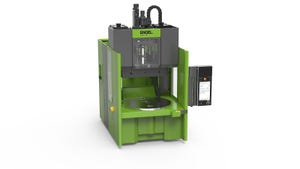PolyOne pairs with biobased plasticizer startup
PolyOne Corp. (Cleveland, OH) has entered into a joint-development agreement with biobased-chemical startup Segetis (Golden Valley, MN) to advance that company's renewably resourced plasticizer. Segetis' proprietary levulinic ketal technology can be used to create plasticizers, solvents, and modifiers for targeted polymers. PolyOne and Segetis say initial developments will be tested in the U.S., but resulting technology platforms will become globally available.
April 12, 2010
PolyOne Corp. (Cleveland, OH) has entered into a joint-development agreement with biobased-chemical startup Segetis (Golden Valley, MN) to advance that company's renewably resourced plasticizer. Segetis' proprietary levulinic ketal technology can be used to create plasticizers, solvents, and modifiers for targeted polymers. PolyOne and Segetis say initial developments will be tested in the U.S., but resulting technology platforms will become globally available.
Specifically, Segetis will utilize PolyOne's compounding expertise to customize formulations for a variety of end-use markets, including electronics, consumer, healthcare, and automotive. PolyOne previously announced joint-development efforts with Archer Daniels Midland to produce bioplasticizers for use in vinyl-related markets. Planned development work with Segetis expands PolyOne's current relationships in bioderived plasticizers to extend into non-vinyl products.
Segetis took part in the Clean Technology Business Forum & Competition, which is organized by the Society of Plastics Engineers (SPE) Environmental Division, and staged during its Global Plastics Environmental Conference (GPEC; March 8-10, Orlando). Cora Liebig, director of R&D at Segetis, told the forum that the company currently has nine patents, but expects that number to expand to as many as 20 in a few years' time. Founded in 2006, Segetis opened a semiworks plant in January 2009 with a capacity of 250,000 lb/yr. The patented technology utilizes levulinic ketals that have been ketalized with levulinate ester. At this time, the company sources the key feedstock, levulinic acid, from China, where corn cobs are converted into the levulinic-acid forerunner and agricultural byproduct furfural. —[email protected]
About the Author(s)
You May Also Like


